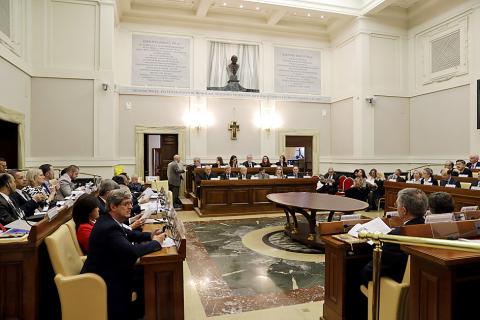Participants at a Vatican conference on organ trafficking on Tuesday challenged China to allow independent scrutiny to ensure it is no longer using organs from executed prisoners, saying Chinese assurances are not enough to prove the transplant program has been reformed.
Sparks flew in the afternoon session of the meeting as former Chinese minister of health Huang Jiefu (黃潔夫) sought to assure the international medical community that China was “mending its ways” after declaring an end to the prisoner harvesting program in 2015.
“I am fully aware of the speculation about my participation in the summit,” Huang told the conference, citing “continuing concerns about the transplant activities.”

Photo: AP
However, he provided scant data to rebut critics, showing only two slides indicating an increased number of living and deceased donors in recent years and China’s recent efforts to crack down on black-market transplant activities.
Huang first publicly acknowledged the inmate harvesting organ program in 2005 and later said as many as 90 percent of Chinese transplant surgeries using organs from dead people came from executed prisoners. He has spearheaded a reform effort and pledged that China put an end to the program in 2015.
However, doubts persist that China is meeting its pledge, given its lack of transparency, the severe shortage of organ donors and China’s longstanding black-market organ trade.
Huang’s colleague, Haibo Wang, stressed the sheer impossibility of trying to fully control China’s transplant activity since there are 1 million medical centers and 3 million licensed doctors operating in the nation. As a result, China proposed at the Vatican meeting that the WHO form a global task force to help crack down on illicit organ trafficking.
Jacob Lavee, president of Israel’s transplant society, said the WHO should be allowed to conduct surprise inspections and interview donor relatives in China.
“As long as there is no accountability for what took place ... there can be no guarantee for ethical reform,” he told the conference in a heated exchange.
He was joined by Gabriel Danilovitch, from the UCLA Medical Center, who challenged the Chinese delegation to declare straight out if prisoner organs were no longer used.
Wang countered that he and Huang spent the past 12 years battling critics inside China and out to reform the sector, and said China should not be singled out for spot WHO inspections.
The back-and-forth underscored the controversy over China’s participation in the conference, after critics sent a letter to organizers and Pope Francis warning that Chinese attendance amounted to a Vatican whitewash of its past practices.
However, organizers stood firm in their invitation.
“Are they doing any illegal transplantation of organs in China? We can’t say,” said Monsignor Marcelo Sanchez Sorondo, chancellor of the Pontifical Academy of Sciences. “But we want to strengthen the movement for change.”

Conflict with Taiwan could leave China with “massive economic disruption, catastrophic military losses, significant social unrest, and devastating sanctions,” a US think tank said in a report released on Monday. The German Marshall Fund released a report titled If China Attacks Taiwan: The Consequences for China of “Minor Conflict” and “Major War” Scenarios. The report details the “massive” economic, military, social and international costs to China in the event of a minor conflict or major war with Taiwan, estimating that the Chinese People’s Liberation Army (PLA) could sustain losses of more than half of its active-duty ground forces, including 100,000 troops. Understanding Chinese

The Ministry of Foreign Affairs (MOFA) yesterday said it is closely monitoring developments in Venezuela, and would continue to cooperate with democratic allies and work together for regional and global security, stability, and prosperity. The remarks came after the US on Saturday launched a series of airstrikes in Venezuela and kidnapped Venezuelan President Nicolas Maduro, who was later flown to New York along with his wife. The pair face US charges related to drug trafficking and alleged cooperation with gangs designated as terrorist organizations. Maduro has denied the allegations. The ministry said that it is closely monitoring the political and economic situation

UNRELENTING: China attempted cyberattacks on Taiwan’s critical infrastructure 2.63 million times per day last year, up from 1.23 million in 2023, the NSB said China’s cyberarmy has long engaged in cyberattacks against Taiwan’s critical infrastructure, employing diverse and evolving tactics, the National Security Bureau (NSB) said yesterday, adding that cyberattacks on critical energy infrastructure last year increased 10-fold compared with the previous year. The NSB yesterday released a report titled Analysis on China’s Cyber Threats to Taiwan’s Critical Infrastructure in 2025, outlining the number of cyberattacks, major tactics and hacker groups. Taiwan’s national intelligence community identified a large number of cybersecurity incidents last year, the bureau said in a statement. China’s cyberarmy last year launched an average of 2.63 million intrusion attempts per day targeting Taiwan’s critical

‘SLICING METHOD’: In the event of a blockade, the China Coast Guard would intercept Taiwanese ships while its navy would seek to deter foreign intervention China’s military drills around Taiwan this week signaled potential strategies to cut the nation off from energy supplies and foreign military assistance, a US think tank report said. The Chinese People’s Liberation Army (PLA) conducted what it called “Justice Mission 2025” exercises from Monday to Tuesday in five maritime zones and airspace around Taiwan, calling them a warning to “Taiwanese independence” forces. In a report released on Wednesday, the Institute for the Study of War said the exercises effectively simulated blocking shipping routes to major port cities, including Kaohsiung, Keelung and Hualien. Taiwan would be highly vulnerable under such a blockade, because it